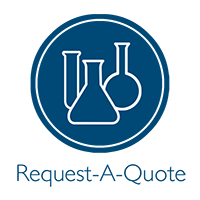This method is for the determination of total hardness from drinking, surface, and saline waters, domestic and industrial wastes. Eriochrome Black T (EBT) indicator is added to the sample and EDTA (ethylenediamine tetraacetate) is titrated into the sample. EBT has a red color in the presence of free calcium and magnesium ions and a blue color when the cations are sequestered which indiates the endpoint of the titration.
The method is suitable for all concentration ranges of hardness, however, in order to avoid large titration volumes, use a sample aliquot containing not more than 25 mg calcium carbonate. Automated titration may be used.
Suspended of colloidal organic matter can intefere with the endpoint.
No Obligation Quotation for Analytical Services
If you would like us to provide a quote for laboratory analysis, just provide us with as much information as you can about your project (the more, the better) and we'll provide you a quote via email. As you are searching or browsing our Analytical Guide, you'll see the Request-A-Quote icon... just click on it to start the request process.
| Hold Times, Preservatives, Preps, Collection, Analytical & Documentation | |
|---|---|
| Holding Time: | 6 months from sample collection to analysis. |
| Preservatives: | Cool to 4°C and add nitric acid to pH < 2. |
| Required Preps: | 250 mL HDPE or amber glass bottle |
| Collection Method: | Grab sampling |
| Analytical Methodology: | Titration |
| Documentation: | |
| Analyte | Formula | CAS Number | Detection Limit | |
|---|---|---|---|---|
| Hardness | 5 |
mg/L | ||
* The analytes and detection limits listed for each method represent the typical detection limits and analytes reported for that particular method. Keep in mind that analyte lists may vary from laboratory to laboratory. Detection limits may also vary from lab to lab and are dependent upon the sample size, matrix, and any interferences that may be present in the sample.